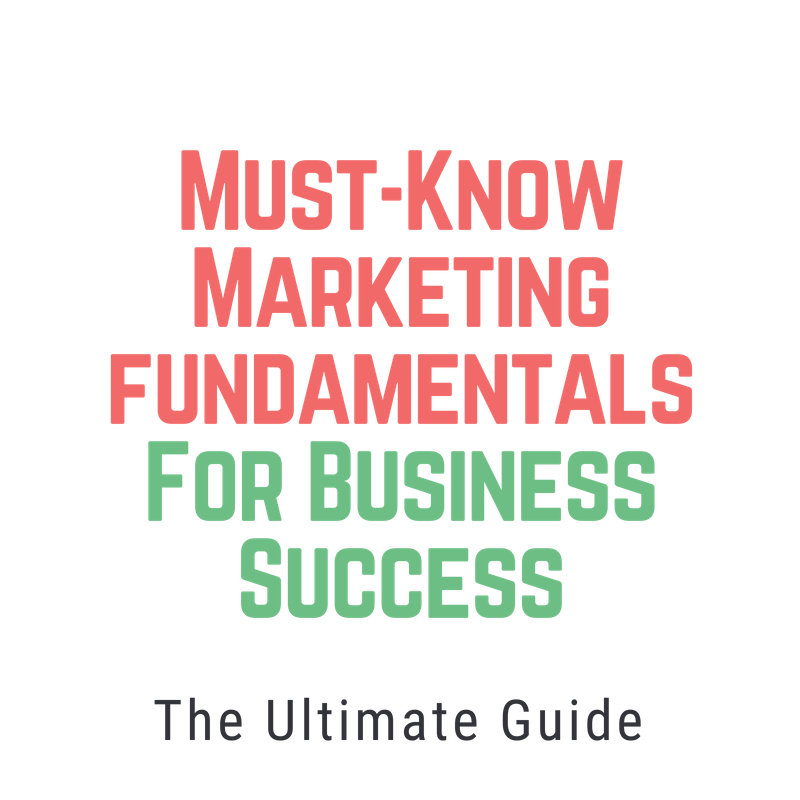Types of Marketing Strategy - Discover New & Time-Tested Strategies
Let's discuss types of marketing strategy that businesses can deploy to reach their ideal customer in the best way. Select your strategies and watch them work.

Overview on Marketing Strategy
A marketing strategy is the angle at which a company approaches their customers to bring in business. There are many different types of marketing strategy, and some of them will be more suited for a certain kind of company, while others will be more appropriate for another.
Overall, a strong marketing strategy is one that effectively combines various marketing communication tools and serves the needs of the targeted customer. It's always important to focus on customer needs and organizational capabilities when selecting a strategy to execute.
Let's take a look at types of marketing strategy:
What types of marketing strategy do you know of? There are a range of types of marketing strategy to learn about and experiment with.
The Big Shift to Relationship Marketing
In the past, marketing was a discipline with a primary focus on transactions. It was very short term and didn't really create much value for customers. In recent decades however, we see that most types of marketing strategies try to implement an overarching type of marketing strategy which we call 'relationship marketing'.
Relationship marketing focuses on building long-term customer relationships. With relationship marketing, organizations consider the lifetime value of their customer and strive to offer better services, higher-quality products, and meaningful long term relationships.
Over the last few years, relationship marketing has included a greater use of social media, an increased focus on customer relationship management, as well as implementing corporate social responsibility.
The goal today is to make a memorable impact on the consumer. Regardless of the specific strategies you chose to implement, you always want to make sure that they satisfy the customer relationship in the long-term.
Types of Marketing Strategy That Have Emerged in the Digital Age
Internet technology has undoubtedly changed the way that businesses go to market. There are a wide range of tools now available for the smart marketer, let's consider the main ones:
Real-Time Marketing Strategy
Large-scale media events are a good time for brands to appear on the scene and make themselves relevant. Real-time marketing is when brands create or join online conversations during large events to create a buzz on social media. Examples of these events are the Super Bowl and Academy awards. This is a good strategy to create brand awareness and liking because brands can associate themselves with something that the consumer is already interested in.
Real-time marketing takes advantage of the online buzz surrounding these large events to reach a wide audience.
Content Marketing Strategy
People want information that solves a problem for them by teaching them to do something or that even entertains them. Content marketing is when brands share expertise that is designed to inform and engage with customers. Content marketing involves tools such as e-books, blogs, how-to-videos and webinars. Inform, but also engage through unique content and storytelling. Content marketing is one of the types of marketing strategy that becomes more solid as you grow the brand and have more stories to share.
Content marketing provides value to consumers by provide a free resource that essentially helps to motivate them to buy your paid products in the future. The content you provide builds trust and gives them a taste of the great things you have to offer.
Check out this useful guide by Moz to help you create an awesome content marketing strategy.
 A Thoughtful Social Media Strategy Can Be a Powerful Tool to Engage with Customers and Motivate Purchases
A Thoughtful Social Media Strategy Can Be a Powerful Tool to Engage with Customers and Motivate PurchasesSocial Media Marketing Strategy
Social media is one of the best types of marketing strategy you can use to grow your business and attract customers. Why? Because it's free!
We've talked about real-time marketing, an avenue that utilizes social media marketing. But social media is a valuable tool for a wider range of approaches.
Social media platforms like Facebook, Twitter and Instagram allow you to share posts such as videos, images and infographics and these can in turn be shared by audience members who love them and want to show them to their friends.
If you have a budget, you can also create ads on social media that further the reach of your posts. Social media can be used to deploy campaigns and to monitor, measure and respond to questions, comments and inquiries.
Here are 3 top tips for creating a powerful social media strategy:
- Check relevance - It's good to occasionally review your social media platforms and ask yourself if a platform is still relevant to your brand goals. Spend more time on the networks that are driving the most traffic or conversions for you. If you are just starting out, look at what content is currently being shared on the platform, and if the content you plan to share works well there.
- Set up a good schedule - Figure out how often you want to post on each of your platforms. Planning your schedule ahead of time helps you to share content that will consistently engage your audience. You can use tools like Hootsuite and Buffer to schedule and automate your social media posts.
- Interact and be genuine - Like any productive conversation, social media is not just for talking, it's for listening too. Pay attention to the conversations and interact with users and posts that are relevant to your brand. Find out where your audience hangs out, and be there. Make sure that there's always a nice balance between your own promotions and interacting with others to help them. Brands that come across as genuine will attract more customers to follow them, and eventually buy from them.
Partnership Marketing Strategy
Partnership marketing is when brands collaborate for greater success.
The whole idea of a partnership marketing strategy is for the brands to create formal associations between them that will result in more business for both brands than could have been achieved separately. Brands with similar customers but different distribution channels can combine marketing expertise and use each others strengths to build brand awareness.
A partnership marketing strategy generally requires these 3 steps:
- Finding an appropriate partner
- Setting realistic goals that meet business objectives
- Tracking results
Partnership marketing can be short-term or long-term. A long-term partnership arrangement is known as a strategic alliance. A strategic alliance extends beyond short term promotional offers into long-term business agreements.
An example of this is the SCENE and Scotiabank strategic alliance. SCENE members collect points for movie theatre purchases that can be redemeed for future purchases (like getting a free movie), and Scoiatbank Visa credit card holders earn additional points when they pay with their Scotiabank Visa card. How does each side benefit? In it's first 14 months the SCENE loyalty program built a database of a million customers and Scotiabank ganed 100,00 new bank accounts from the program.
Partnership marketing is effective.
Partnership marketing is one of the easiest types of marketing strategy when you have connections with companies that are well-suited to your brand.
 Use a Combination of The Many Types of Marketing Strategy to Attract Your Target Customers
Use a Combination of The Many Types of Marketing Strategy to Attract Your Target CustomersMarketing Strategies Based on Segmentation
A market segment means a piece of the market. In marketing, there are two main market segments: the business market and the consumer market. Let's look at these main types of marketing strategy:
B2B Marketing Strategy
A business-to-business marketing strategy involves the marketing of products to companies, governments or non-profit organizations for use in the creation of goods and services that they then produce and market to others.
B2B marketing techniques rely on similar principles as B2C or business-to-consumer marketing. However, a key difference is that consumers generally choose products based on price and other emotional factors such as popularity and status, while business markets focus solely on price and profit potential.
B2C Marketing Strategy
This is a type of marketing strategy that most people are familiar with, and perhaps what they usually think of. B2C marketing is business-to-consumer and it involves the promotion of products and services to consumers. When you are marketing to a consumer, you want to focus on the benefits from an emotional perspective (again, this is a key difference between B2B and B2C). Another difference is that consumers usually expect a variety of distribution channels for convenience. B2C is the most commonly used strategy out of the two.
Other types of Market Segmentation Strategies
Here are market segmentation strategies used for B2B and B2C markets:
Mass Marketing Strategy
A mass marketing strategy is when a product with broad appeal is widely marketed to the entire market with no product or marketing differentiation at all. This approach is seen less frequently today (due to competition), but can be found with items such as fruit and vegetables (e.g. broccoli) that are sold to all target groups with no variation from either a product or marketing perspective. Mass marketing is one of the types of marketing strategies where success will really depend on the product being sold.
Segment Marketing Strategy
Segment marketing involves the marketing of a wide range of different products and brands to specifically meet the needs of an organization's varied target markets. Marketing professionals approach each segment differently, after fully understanding the needs, lifestyle, demographics, and personality of the target customer. For example, a company that sells running shoes might have a range of products of men, another one for women, and a line for children, with each range of products adapted to the specific needs of each segment.
Niche Marketing Strategy
Niche marketing is a strategy where a company restricts its efforts to marketing a limited product line to a narrow but profitable segment of the market.
A business that focuses on a niche is addressing a need for a product or service that is not being addressed by mainstream providers. Targeting a niche market gives you the opportunity to provide products and services to a subset of a larger group that may generally be overlooked. Niche marketing is one of the types of marketing strategy that may work well if you find yourself in this sweet-spot.
This article highlights some useful considerations when defining a niche market.
Individualised Marketing Strategy
Internet technology enables marketers to reach consumers more directly through individualised marketing. Individualised marketing can also be called personalised marketing or one-to-one marketing and it involves customising offers and sometimes products to fit individual needs. Individualised marketing can result in an improved customer experience when companies are able to direct customer to exactly what they need. This strategy can involve tools like personalised emails and product recommendations.
Inbound Marketing Strategy
Think of marketing in terms of push and pull. Inbound marketing is pull, whereas outbound marketing is push. Inbound marketing is focused on drawing potential customers in, rather than pushing out a brand or product. Digital marketing usually is focused on inbound marketing strategies such as content marketing, social media, and SEO (Search Engine Optimization), in an attempt to attract people's attention. Inbound marketing uses owned and earned media (that a business owns e.g. a blog, or PR that is freely-generated), while outbound marketing is based on paid media.
 Inbound Marketing Includes Strategies like Search Engine Optimization (SEO)
Inbound Marketing Includes Strategies like Search Engine Optimization (SEO)Outbound Marketing Strategy
An outbound marketing strategy is generally associated with paid media such as TV advertising, display advertising, and pay-per-click advertising. This type of marketing strategy aims to directly promote a product or service and is quite costly compared to inbound marketing. Outbound marketing is based on one-way communication. In the marketing world, inbound marketing is increasingly viewed as superior since it facilitates interaction and provides something useful to the customer.
Influencer Marketing Strategy
Influncer marketing is one of the more new and flashy marketing strategies, because it works brilliantly in an era when people practically live on the web. Influencers are people with huge followings on the internet. They might have a huge number of followers on Instagram, YouTube, Twitter or another channel. Influncer marketing is a great opportunity for companies who want to reach out to their target market through individuals that the target market respects and ardently follows. With influencer marketing, one size doesn't fit all. It's important to tailor your approach to the specific influencer and keep in mind the values of their audience before approaching them.
Picking a strategy out of the many different types of marketing strategy will depend on your brand goals. Some types of marketing strategy will require a higher budget, but look out for strategies that are based on organic engagement that you can create for free, i.e. through inbound marketing.
Transactional Marketing Strategy
Transactional marketing is essentially the opposite of relationship marketing. This is one of the types of marketing strategies that have become unpopular. You should know about it, but it's likely not something you want to implement since it just won't cut it anymore. Transactional marketing focuses on one-off sales rather than customer loyalty and retention. It aims to boosts the number of individual sales, but it is not as effective as relationship marketing because it does not consider the customer lifetime value, and how the company can please a customer in the long-term. This is where transactional marketing loses out - when a customer feels fully taken of, not just at the point of sale, they'll keep coming back and keep increasing your revenue.
Affiliate Marketing Strategy
Affiliate marketing is one of my favourite types of marketing strategy. Affiliate marketing is a performance-based strategy, where a person earns a commission by promoting another person's products. When it's successfully carried out, it's a win-win situation because the brand sells a product and the affiliate makes a percentage on the sale. It's a reward and incentive for the publisher/affiliate's hard work in promoting the product. Companies can create their own affiliate programs as a way to get their product in front of more people. Two very popular online affiliate websites are Amazon Associates and Commission Junction.
Direct Marketing Strategy
Direct marketing is a promotional method used to promote a product or brand to the target customer without the use of an advertising middleman. Examples of direct marketing include phone calls, coupons, emails, catalogues and targeted online display ads. Direct marketing aims to compel the customer to follow through with an action such as visiting a website, calling for more information, providing their personal information for a quote, or straight-up making a purchase. Direct marketing is useful for allowing marketers to directly measure the results of a campaign. This type of marketing is also called direct response marketing.
There are many types of marketing strategy. Most of types of marketing strategy discussed in this post have evolved over time, though some are newer.
Email Marketing
Email marketing is an effective digital marketing strategy that involves sending emails to prospective customers. Email marketing is one of the types of marketing strategy that can boost another strategy, such as affiliate marketing. A well-executed email sequence can turn prospects into customers, and then turn these customers into loyal fans.
Email marketing is highly effective because:
- It's a huge communication tool - People constantly check their emails all day
- It's a form of media that you own - Unlike social media platforms that could shut down at any moment
- It has a huge ROI - According to a study by Campaign Monitor, for every $1 spent on email marketing, $44 is made in return. You can see more cool email marketing stats here.
A successful email marketing strategy starts with targeting the customers you want on your list. With tools like MailChimp, companies can create a sign-up form on their websites or create attractive landing pages that motivate potential customers to join their email list.
Word of Mouth Marketing
Word of mouth marketing, also known as WOMM, or simply WOM, is a type of marketing strategy that relies on our basic human desire to share things that trigger a reaction in us, whether good or bad. Word of mouth marketing encompasses the whole range of discussions and recommendations that occur whether it's face-to-face or online through social media. In today's hyper-connected world, a single recommendation can have a greater impact than ever before, so companies deploy word of mouth strategies to capitalize on this opportunity.
A great place to start with word of mouth is your employees. Companies can turn their employees into brand marketers through promoting a positive work environment and engaging them through demonstrations of the brand's/product's benefits. Treat your employees well like your other customers, and great things will happen - they'll spread the word - what's particularly special is they'll be able to excellently describe what sets your brand apart.
Additional Marketing Strategies and Helpful Tips - My Online Course

Thanks for reading this post on types of marketing strategy. If you're looking to boost your marketing knowledge and learn more interesting ways to generate business, enroll in my Udemy course on Must-Know Marketing Fundamentals For Business Success.
It's a 3-hour online course packed with examples of marketing strategies that set the top brands apart from everyone else, as well as marketing fundamentals that are absolutely necessary to generate sustainable revenue. You can take the course at your own pace and convenience. As you took the time to check out this long post, here's a 75% off coupon to get the course at a discount for a limited time.
As you've seen, there are many types of marketing strategy that companies can choose to implement. The first step is to do your research and see what would fit for the business and target customer. Most of the time, brands use a combination of the above strategies for maximum impact.
Thanks for reading! If you liked this content, share with a friend:
Recent Articles
-
5 Subtle Habits That Quietly Transform Your Life Over Time
Jan 25, 26 08:21 PM
Progress towards the things that matter isn't usually loud or dramatic. Here are 5 subtle habits that quietly transform your life over time. -
Inner Work with Marcus Lynn | How to Make Change More Realistic
Jan 19, 26 06:24 PM
In this spotlight interview, therapist Marcus Lynn explains how we can begin to see emotions as information and make change more realistic in our lives. -
7 Best Personal Development Courses to Grow Your Skills and Mindset
Jan 01, 26 11:04 PM
To reach your goals for the year, there are are certain skills you might need to unlock first. Here are the best personal development courses to level up your life in 2026.





New! Comments
Have your say about what you just read! Leave me a comment in the box below.